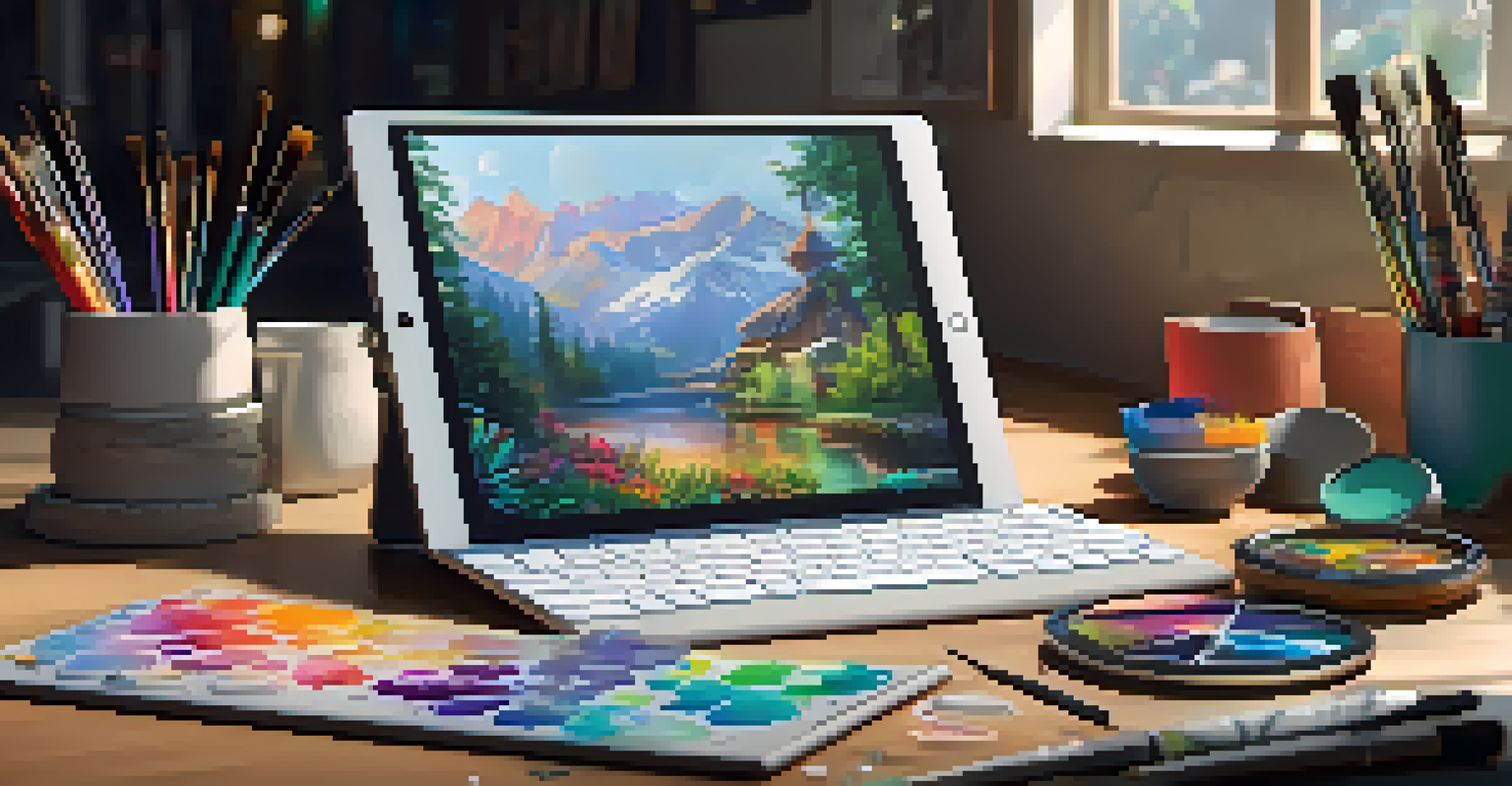Understanding the Relationship Between NFTs and IP Rights

What Are NFTs and Why Do They Matter?
NFTs, or non-fungible tokens, are unique digital assets that represent ownership of a specific item, often linked to art, music, or collectibles. Unlike cryptocurrencies such as Bitcoin, which are interchangeable, each NFT has distinct characteristics that make it one-of-a-kind. This uniqueness is what drives their value in the digital marketplace, capturing the attention of artists, collectors, and investors alike.
NFTs are a way for artists to monetize their work directly and retain more control over their creations.
The rise of NFTs has revolutionized the way creators monetize their work, allowing them to sell directly to consumers without intermediaries. For instance, an artist can mint an NFT of their painting, enabling them to retain a portion of future sales through smart contracts. This shift not only empowers creators but also raises questions about traditional ownership and the rights that come with it.
Understanding NFTs is essential to grasp their implications for intellectual property (IP) rights. As digital assets continue to proliferate, the intersection of NFTs and IP becomes increasingly significant, prompting discussions around ownership, copyright, and licensing.
Exploring Intellectual Property Rights
Intellectual property rights are legal protections that grant creators exclusive rights to their creations, encompassing everything from music and art to inventions and trademarks. These rights are crucial in ensuring that creators can benefit from their work without the fear of unauthorized use or reproduction. However, the digital landscape has complicated how these rights are enforced and understood.

For example, copyright protects original works of authorship, while trademarks safeguard brand identities. With the advent of NFTs, the conversation around IP rights has expanded, as many NFT creators are unsure about what rights they actually hold when they sell a token. This ambiguity can lead to potential legal disputes, making it imperative for creators to understand their IP rights thoroughly.
NFTs Redefine Digital Ownership
NFTs enable unique ownership of digital assets, transforming how creators monetize their work.
Navigating intellectual property in the context of NFTs requires a blend of traditional legal knowledge and an understanding of digital assets. As more artists and brands embrace this technology, it's crucial to establish clear guidelines that protect both creators and consumers in this evolving landscape.
Ownership vs. Copyright: What's the Difference?
When discussing NFTs, it's vital to differentiate between ownership and copyright. Owning an NFT gives you the token, which signifies ownership of a digital item, but it doesn't automatically confer copyright. For instance, if you buy an NFT of a digital artwork, you own the token, but the original artist retains the copyright unless explicitly transferred.
In the digital landscape, understanding intellectual property rights is more important than ever for creators.
This distinction can lead to confusion for new NFT buyers. Many might assume that purchasing an NFT grants them full rights to use, modify, or reproduce the artwork, but that's not always the case. It's essential for buyers to read the terms associated with each NFT to understand what rights they are acquiring.
As the NFT market grows, clearer guidelines surrounding ownership and copyright are needed to protect both creators and collectors. By understanding these differences, participants in the NFT space can make informed decisions and foster a more transparent marketplace.
Licensing and NFTs: A New Frontier
Licensing is an important aspect of intellectual property that allows creators to control how their work is used by others. In the context of NFTs, licensing agreements can be especially complex, as they determine how the digital asset can be utilized after sale. Creators may include specific terms in the NFT's smart contract, specifying the rights granted to the buyer.
For example, a musician might sell an NFT that allows the owner to use a song in a personal project, but not for commercial purposes. This flexibility can open new revenue streams for creators while giving buyers more value from their purchases. However, it also raises questions about enforcement and compliance.
Understanding IP Rights is Crucial
Navigating the complexities of intellectual property rights in the NFT space is essential for creators to protect their work.
Navigating licensing in the NFT space requires clarity and communication. As both buyers and sellers engage in these transactions, understanding the nuances of licensing agreements will be crucial for protecting rights and maximizing the potential of digital assets.
The Potential for Copyright Infringement
As NFTs become more prevalent, the potential for copyright infringement grows. Many creators may find their work tokenized without permission, leading to disputes over ownership and rights. For instance, if someone mints an NFT of a popular meme without the creator's consent, it raises significant legal and ethical questions.
This issue is compounded by the anonymity and decentralized nature of blockchain technology, which can make it challenging to identify infringers. As a result, creators need to be proactive in protecting their work and understanding their rights in the NFT space. Tools and platforms that allow for easier monitoring of IP usage can be invaluable.
The rise of NFTs necessitates a reevaluation of how copyright laws are applied in the digital realm. By fostering a culture of respect for creators' rights, the NFT community can work towards minimizing infringement and promoting ethical practices.
Best Practices for Creators in the NFT Space
For creators diving into the NFT marketplace, understanding your rights and responsibilities is crucial. First and foremost, ensure you have a clear grasp of your intellectual property rights before minting an NFT. Consider consulting with a legal professional who specializes in IP to clarify your position and any potential risks.
Additionally, be transparent about the rights you are granting to buyers when selling your NFTs. Clearly outline what the buyer can and cannot do with the digital asset, whether that’s for personal use, commercial use, or something else. This not only protects you but also sets clear expectations for the buyer.
Licensing Adds Complexity to NFTs
Clear licensing agreements are vital for defining how digital assets can be used, benefiting both creators and buyers.
Finally, stay informed about the evolving landscape of NFTs and IP rights. As technology and regulations change, being proactive and adaptable will help you navigate this exciting yet complex world, ensuring your creative endeavors are both rewarding and legally sound.
Future Trends: NFTs and IP Rights
Looking ahead, the relationship between NFTs and intellectual property rights is poised to evolve rapidly. As the market matures, we can expect to see more robust legal frameworks that provide clearer guidance for creators and collectors alike. This may include standardized contracts and more comprehensive copyright protections tailored for the digital age.
Additionally, the integration of artificial intelligence into the NFT space could provide new tools for tracking ownership and usage rights, helping to mitigate issues of infringement. Imagine a system where AI monitors digital assets and alerts creators if their work is being used without authorization.

As we embrace these advancements, both creators and consumers will need to remain vigilant and informed. By fostering a collaborative environment that respects and protects intellectual property, the NFT space can flourish while honoring the rights of all participants.